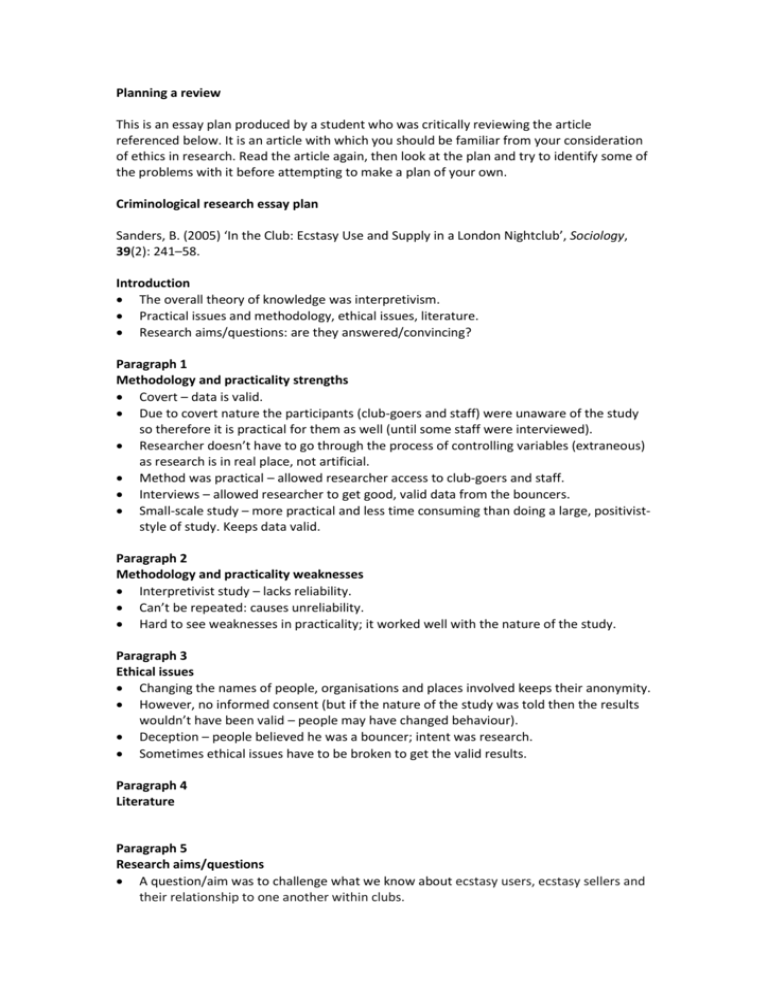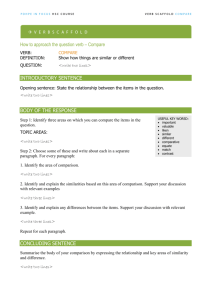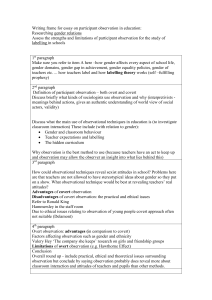Planning a review
advertisement

Planning a review This is an essay plan produced by a student who was critically reviewing the article referenced below. It is an article with which you should be familiar from your consideration of ethics in research. Read the article again, then look at the plan and try to identify some of the problems with it before attempting to make a plan of your own. Criminological research essay plan Sanders, B. (2005) ‘In the Club: Ecstasy Use and Supply in a London Nightclub’, Sociology, 39(2): 241–58. Introduction The overall theory of knowledge was interpretivism. Practical issues and methodology, ethical issues, literature. Research aims/questions: are they answered/convincing? Paragraph 1 Methodology and practicality strengths Covert – data is valid. Due to covert nature the participants (club-goers and staff) were unaware of the study so therefore it is practical for them as well (until some staff were interviewed). Researcher doesn’t have to go through the process of controlling variables (extraneous) as research is in real place, not artificial. Method was practical – allowed researcher access to club-goers and staff. Interviews – allowed researcher to get good, valid data from the bouncers. Small-scale study – more practical and less time consuming than doing a large, positiviststyle of study. Keeps data valid. Paragraph 2 Methodology and practicality weaknesses Interpretivist study – lacks reliability. Can’t be repeated: causes unreliability. Hard to see weaknesses in practicality; it worked well with the nature of the study. Paragraph 3 Ethical issues Changing the names of people, organisations and places involved keeps their anonymity. However, no informed consent (but if the nature of the study was told then the results wouldn’t have been valid – people may have changed behaviour). Deception – people believed he was a bouncer; intent was research. Sometimes ethical issues have to be broken to get the valid results. Paragraph 4 Literature Paragraph 5 Research aims/questions A question/aim was to challenge what we know about ecstasy users, ecstasy sellers and their relationship to one another within clubs. Research has answered it to an extent – research stated that bouncers sold on drugs taken from club-goers. How people turn a blind eye because of the effect the drugs have. However, research has reinforced the concept of drugs being available in clubs (what people knew already). Reinforced that drug taking is very common and policing/controlling the drug is ineffective. Paragraph 6 Conclusion State that all research will always be criticised one way or another (i.e. an interpretivist method will always be criticised from a positivist perspective). General view of this research – the practicality was good, methodology creates valid but nonreplicable (unreliable) data. Ethical issues have been broken but could be deemed necessary for right results, i.e. answering the questions/aims of the study.









